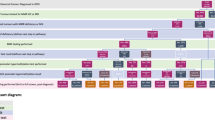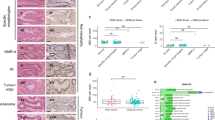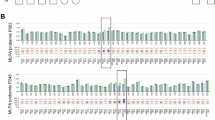Abstract
Lynch syndrome is the most common form of hereditary colorectal cancer (CRC). This review covers the cardinal features of Lynch syndrome with particular emphasis upon its diagnostic criteria, molecular genetics, natural history, genetic counseling, surveillance and management. Considerable attention has been given to the etiologic role of mismatch repair (MMR) genes as well as low penetrance alleles and modifier genes. The American founder mutation, a deletion of exons 1–6 of MSH2, is discussed in some detail, owing to its high frequency in the US (19 000–30 000 carriers). Genetic counseling is essential prior to patients’ undergoing DNA testing and again when receiving their test results. Families with a lower incidence of CRC and extracolonic cancers, in the face of being positive for Amsterdam I criteria but who do not have MMR deficiency by tumor testing, are probably not Lynch syndrome, and thereby should preferably be designated as familial CRC of undetermined type. Patients who are either noncompliant or poorly compliant with colonoscopy, and who are MMR mutation positive, may be candidates for prophylactic colectomy, while MMR mutation-positive women who are noncompliant with gynecologic surveillance may be candidates for prophylactic hysterectomy and bilateral salpingo-oophorectomy.
Similar content being viewed by others
Log in or create a free account to read this content
Gain free access to this article, as well as selected content from this journal and more on nature.com
or
References
International Agency for Research on Cancer: Globocan 2002. Available at: http://www-dep.iarc.fr/ Accessed 06/01/2005.
Lynch HT, de la Chapelle A : Genetic susceptibility to non-polyposis colorectal cancer. J Med Genet 1999; 36: 801–818.
Lynch HT, de la Chapelle A : Genomic medicine: hereditary colorectal cancer. N Engl J Med 2003; 348: 919–932.
Jass JR : Colorectal adenoma progression and genetic change: is there a link? Ann Med 1995; 27: 301–306.
Smyrk TC, Watson P, Kaul K, Lynch HT : Tumor-infiltrating lymphocytes are a marker for microsatellite instability in colorectal cancer. Cancer 2001; 91: 2417–2422.
Vogelstein B, Kinzler KW (eds): The genetic basis of human cancer. New York: McGraw-Hill, 1998.
Liu B, Parsons RE, Hamilton SR et al: hMSH2 mutations in hereditary nonpolyposis colorectal cancer kindreds. Cancer Res 1994; 54: 4590–4594.
Froggatt NJ, Koch J, Davies R et al: Genetic linkage analysis in hereditary non-polyposis colon cancer syndrome. J Med Genet 1995; 32: 352–357.
Desai DC, Lockman JC, Chadwick RB et al: Recurrent germline mutation in MSH2 arises frequently de novo. J Med Genet 2000; 37: 646–652.
Hampel H, Frankel WL, Martin E et al: Screening for Lynch syndrome (hereditary nonpolyposis colorectal cancer). N Engl J Med 2005; 352: 1851–1860.
Nystrom-Lahti M, Kristo P, Nicolaides NC et al: Founding mutations and Alu-mediated recombination in hereditary colon cancer. Nat Med 1995; 1: 1203–1206.
Moisio A-L, Sistonen P, Weissenbach J, de la Chapelle A, Peltomaki P : Age and origin of two common MLH1 mutations predisposing to hereditary colon cancer. Am J Hum Genet 1996; 59: 1243–1251.
Foulkes WD, Thiffault I, Gruber SB et al: The founder mutation MSH2*1906G → C is an important cause of hereditary nonpolyposis colorectal cancer in the Ashkenazi Jewish population. Am J Hum Genet 2002; 71: 1395–1412.
de la Chapelle A : Genetic predisposition to colorectal cancer. Nat Rev Cancer 2004; 4: 769–780.
Wagner A, Barrows A, Wijnen JT et al: Molecular analysis of hereditary nonpolyposis colorectal cancer in the United States: high mutation detection rate among clinically selected families and characterization of an American founder genomic deletion of the MSH2 gene. Am J Hum Genet 2003; 72: 1088–1100.
Nakagawa H, Hampel H, de la Chapelle A : Identification and characterization of genomic rearrangements of MSH2 and MLH1 in Lynch syndrome (HNPCC) by novel techniques. Hum Mutat 2003; 22: 258.
Lynch HT, Coronel SM, Okimoto R et al: A founder mutation of the MSH2 gene and hereditary nonpolyposis colorectal cancer in the United States. JAMA 2004; 291: 718–724.
Wagner A, van der Klift H, Franken P et al: A 10 Mb paracentric inversion of chromosome arm 2p inactivates MSH2 and is responsible for HNPCC in a North-American kindred. Genes Chromosomes Cancer 2002; 35: 49–57.
Lynch HT, de la Chapelle A, Hampel H et al: The American founder mutation for Lynch syndrome: prevalence estimates and implications. Cancer 2005; 106: 448–452.
Gallinger S, Aronson M, Shayan K et al: Gastrointestinal cancers and neurofibromatosis type 1 features in children with a germline homozygous MLH1 mutation. Gastroenterology 2004; 126: 576–585.
Laken SJ, Petersen GM, Gruber SB et al: Familial colorectal cancer in Ashkenazim due to a hypermutable tract in APC. Nat Genet 1997; 17: 79–83.
Bian Y, Caldes T, Wijnen J et al: TGFBR1*6A may contribute to hereditary colorectal cancer. J Clin Oncol 2005; 23: 3074–3078.
Pasche B, Knobloch TJ, Bian Y et al: Somatic acquisition and signaling of TGFBR1*6A in cancer. JAMA 2005; 294: 1634–1646.
Jones JS, Chi X, Gu X et al: p53 polymorphism and age of onset of hereditary nonpolyposis colorectal cancer in a Caucasian population. Clin Cancer Res 2004; 10: 5845–5849.
Kruger S, Bier A, Engel C et al: The p53 codon 72 variation is associated with the age of onset of hereditary non-polyposis colorectal cancer (HNPCC). J Med Genet 2005; 42: 769–773.
Sotamaa K, Liyanarachchi S, Mecklin JP et al: p53 codon 72 and MDM2 SNP309 polymorphisms and age of colorectal cancer onset in Lynch syndrome. Clin Cancer Res 2005; 11: 6840–6844.
Vasen HFA, Boland CR : Progress in genetic testing, classification, and identification of Lynch syndrome. JAMA 2005; 293: 2028–2930.
Rodriguez-Bigas MA, Boland CR, Hamilton SR et al: A National Cancer Institute workshop on hereditary nonpolyposis colorectal cancer syndrome: meeting highlights and Bethesda Guidelines. J Natl Cancer Inst 1997; 89: 1758–1762.
Ionov YM, Peinado MA, Malkhosyan S, Shibata D, Perucho M : Ubiquitous somatic mutations in simple repeated sequences reveal a new mechanism for colonic carcinogenesis. Nature 1993; 363: 558–561.
Peltomäki P, Aaltonen L, Sistonen P et al: Genetic mapping of a locus predisposing to human colorectal cancer. Science 1993; 260: 810–812.
Aaltonen LA, Peltomaki P, Leach FS et al: Clues to the pathogenesis of familial colorectal cancer. Science 1993; 260: 812–816.
Thibodeau SN, Bren G, Schaid D : Microsatellite instability in cancer of the proximal colon. Science 1993; 260: 816–819.
Lin KM, Shashidharan M, Thorson AG et al: Cumulative incidence of colorectal and extracolonic cancers in MLH1 and MSH2 mutation carriers of hereditary nonpolyposis colorectal cancer. J Gastrointest Surg 1998; 2: 67–71.
Lynch HT, Lynch PM : Molecular screening for the Lynch syndrome – better than family history? N Engl J Med 2005; 352: 1920–1922.
Hendriks Y, Franken P, Dierssen JW et al: Conventional and tissue microarray immunohistochemical expression analysis of mismatch repair in hereditary colorectal tumors. Am J Pathol 2003; 162: 469–477.
Guttmacher AE, Collins FS, Carmona RH : The family history – more important than ever. N Eng J Med 2004; 351: 2333–2336.
Lindor NM, Burgart LJ, Leontovich O et al: Immunohistochemistry versus microsatellite instability testing in phenotyping colorectal tumors. J Clin Oncol 2002; 20: 1043–1048.
Piñol V, Castells A, Andreu M et al: Accuracy of revised Bethesda guidelines, microsatellite instability, and immunohistochemistry for the identification of patients with hereditary nonpolyposis colorectal cancer. JAMA 2005; 293: 1986–1994.
Watson P, Ashwathnarayan R, Lynch HT, Roy HK : Tobacco use and increased colorectal cancer risk in patients with hereditary nonpolyposis colorectal cancer (Lynch syndrome). Arch Intern Med 2004; 164: 2429–2431.
Arnold CN, Goel A, Boland CR : Role of hMLH1 promoter hypermethylation in drug resistance to 5-fluorouracil in colorectal cancer cell lines. Int J Cancer 2003; 106: 66–73.
Aebi S, Kurdi-Haider B, Gordon R et al: Loss of DNA mismatch repair in acquired resistance to cisplatin. Cancer Res 1996; 56: 3087–3090.
Magrini R, Bhonde MR, Hanski ML et al: Cellular effects of CPT-11 on colon carcinoma cells: dependence on p53 and hMLH1 status. Int J Cancer 2002; 101: 23–31.
Gryfe R, Kim H, Hsieh ETK et al: Tumor microsatellite instability and clinical outcome in young patients with colorectal cancer. N Engl J Med 2000; 342: 69–77.
Ribic CM, Sargent DJ, Moore MJ et al: Tumor microsatellite-instability status as a predictor of benefit from fluorouracil-based adjuvant chemotherapy for colon cancer. N Engl J Med 2003; 349: 247–257.
Carethers JM, Smith EJ, Behling CA et al: Use of 5-fluorouracil and survival in patients with microsatellite-unstable colorectal cancer. Gastroenterology 2004; 126: 394–401.
de Vos tot Nederveen Cappel WH, Meulenbeld HJ, Kleibeuker JH et al: Survival after adjuvant 5-FU treatment for Stage III colon cancer in hereditary nonpolyposis colorectal cancer. Int J Cancer 2004; 109: 468–471.
Johnson L, Chu E : Lack of benefit of 5-fluorouracil-based adjuvant chemotherapy in colorectal cancer with microsatellite instability. Clin Colorectal Cancer 2002; 2: 146–148.
Umar A, Boland CR, Terdiman JP et al: Revised Bethesda Guidelines for hereditary nonpolyposis colorectal cancer (Lynch syndrome) and microsatellite instability. J Natl Cancer Inst 2004; 96: 261–268.
Fallik D, Borrini F, Boige V et al: Microsatellite instability is a predictive factor of the tumor response to irinotecan in patients with advanced colorectal cancer. Cancer Res 2003; 63: 5738–5744.
Lynch HT : Family information service and hereditary cancer. Cancer 2001; 91: 625–628.
American Society of Human Genetics: ASHG statement: professional disclosure of familial genetic information. Am J Hum Genet 1998; 62: 474–483.
Hampel H, Stephens JA, Pukkala E et al: Cancer risk in hereditary nonpolyposis colorectal cancer syndrome: later age of onset. Gastroenterology 2005; 129: 415–421.
Lindor NM, Rabe K, Petersen GM et al: Lower cancer incidence in Amsterdam-I criteria families without mismatch repair deficiency: familial colorectal cancer type X. JAMA 2005; 293: 1979–1985.
Lynch HT, Kimberling W, Albano WA et al: Hereditary nonpolyposis colorectal cancer (Lynch syndromes I and II). I. Clinical description of resource. Cancer 1985; 56: 934–938.
Lynch HT, Schuelke GS, Kimberling WJ et al: Hereditary nonpolyposis colorectal cancer (Lynch syndromes I and II). II. Biomarker studies. Cancer 1985; 56: 939–951.
Broaddus RR, Lynch PM, Lu KH, Luthra R, Michelson SJ : Unusual tumors associated with the hereditary nonpolyposis colorectal cancer syndrome. Mod Pathol 2004; 17: 981–989.
Sijmons R, Hofstra R, Hollema H et al: Inclusion of malignant fibrous histiocytoma in the tumour spectrum associated with hereditary non-polyposis colorectal cancer. Genes Chromosomes Cancer 2000; 29: 353–355.
den Bakker MA, Seynaeve C, Kliffen M, Dinjens WN : Microsatellite instability in a pleomorphic rhabdomyosarcoma in a patient with hereditary nonpolyposis colorectal cancer. Histopathology 2003; 43: 297–299.
Suwa K, Ohmori M, Miki H : Microsatellite alterations in various sarcomas in Japanese patients. J Orthop Sci 1999; 4: 223–230.
Kawaguchi K, Oda T, Takahira T et al: Microsatellite instability and hMLH1 and hMSH2 expression analysis in soft tissue sarcomas. Oncol Rep 2005; 13: 241–246.
Soravia C, van der Klift H, Brundler MA et al: Prostate cancer is part of the hereditary non-polyposis colorectal cancer (HNPCC) tumor spectrum. Am J Med Genet 2003; 121A: 159–162.
Lynch PM, Lynch HT, Harris RE : Hereditary proximal colonic cancer. Dis Colon Rectum 1977; 20: 661–668.
Rijcken FEM, Hollema H, Kleibeuker JH : Proximal adenomas in hereditary non-polyposis colorectal cancer are prone to rapid malignant transformation. Gut 2002; 50: 382–386.
Lynch HT, Casey MJ, Lynch J, White TEK, Godwin AK : Genetics and ovarian carcinoma. Semin Oncol 1998; 25: 265–281.
Järvinen HJ, Aarnio M, Mustonen H et al: Controlled 15-year trial on screening for colorectal cancer in families with hereditary nonpolyposis colorectal cancer. Gastroenterology 2000; 118: 829–834.
Vasen HFA, Nagengast FM, Khan PM : Interval cancers in hereditary non-polyposis colorectal cancer (Lynch syndrome). Lancet 1995; 345: 1183–1184.
Church JM : Prophylactic colectomy in patients with hereditary nonpolyposis colorectal cancer. Ann Med 1996; 28: 479–482.
Lynch HT : Is there a role for prophylactic subtotal colectomy among hereditary nonpolyposis colorectal cancer germline mutation carriers? Dis Colon Rectum 1996; 39: 109–110.
Parsons R, Li GM, Longley MJ et al: Hypermutability and mismatch repair deficiency in RER+ tumor cells. Cell 1993; 75: 1227–1236.
Koi M, Umar A, Chauhan DP et al: Human chromosome 3 corrects mismatch repair deficiency and microsatellite instability and reduces N-methyl-Ń-nitro-N-nitrosoguanidine tolerance in colon tumor cells with homozygous hMLH1 mutation (published erratum appears in Cancer Res 55:201, 1995). Cancer Res 1994; 54: 4308–4312.
Hawn MT, Umar A, Carethers JM et al: Evidence for a connection between the mismatch repair system and the G2 cell cycle checkpoint. Cancer Res 1995; 55: 3721–3725.
Carethers JM, Hawn MT, Chauhan DP et al: Competency in mismatch repair prohibits clonal expansion of cancer cells treated with N-methyl-N′-nitro-N-nitrosoguanidine. J Clin Invest 1996; 98: 199–206.
Branch P, Aquilina G, Bignami M, Karran P : Defective mismatch binding and a mutator phenotype in cells tolerant to DNA damage. Nature 1993; 362: 652–654.
Branch P, Aquilina G, Hess P, Bignami M, Karran P : Mammalian cells defective in DNA mismatch correction. Ann NY Acad Sci 1994; 726: 355–358.
Branch P, Hampson R, Karran P : DNA mismatch binding defects, DNA damage tolerance, and mutator phenotypes in human colorectal carcinoma cell lines. Cancer Res 1995; 55: 2304–2309.
Elsaleh H, Joseph D, Grieu F, Spry N, Iacopetta B : Association of tumour site and sex with survival benefit from adjuvant chemotherapy in colorectal cancer. Lancet 2000; 355: 1745–1750.
Aaltonen LA, Salovaara R, Kristo P et al: Incidence of hereditary nonpolyposis colorectal cancer and the feasibility of molecular screening for the disease. N Engl J Med 1998; 338: 1481–1487.
Ransohoff DF : Colon cancer screening in 2005: status and challenges. Gastroenterology 2005; 128: 1685–1695.
Burt R, Neklason DW : Genetic testing for inherited colon cancer. Gastroenterology 2005; 128: 1696–1716.
Vasen HFA, Mecklin J-P, Meera Khan P, Lynch HT : The International Collaborative Group on Hereditary Nonpolyposis Colorectal Cancer (ICG-HNPCC). Dis Colon Rectum 1991; 34: 424–425.
Vasen HFA, Watson P, Mecklin J-P, Lynch HT, ICG-HNPCC: New clinical criteria for hereditary nonpolyposis colorectal cancer (HNPCC, Lynch syndrome) proposed by the International Collaborative Group on HNPCC. Gastroenterology 1999; 116: 1453–1456.
Laghi L, Bianchi P, Roncalli M, Malesci A : Revised Bethesda guidelines for hereditary nonpolyposis colorectal cancer (Lynch syndrome) and microsatellite instability. J Natl Cancer Inst 2004; 96: 1402–1403.
Acknowledgements
This article was supported by revenue from Nebraska cigarette taxes awarded to Creighton University by the Nebraska Department of Health and Human Services. Its contents are solely the responsibility of the authors and do not necessarily represent the official views of the State of Nebraska or the Nebraska Department of Health and Human Services. Support was also given by the Jacqueline Seroussi Memorial Foundation for Cancer Research, by the National Institutes of Health through Grant nos. 1U01 CA 86389-04, P30 CA 16058 and R01 CA 67941. Dr Henry Lynch's work is partially funded through the Charles F and Mary C Heider Chair in Cancer Research, which he holds at Creighton University. Dr de la Chapelle's work is partially funded by the State of Ohio Biomedical and Technology Transfer Commission. The views expressed in this article are those of the authors and do not necessarily reflect the views of the State of Ohio Biomedical and Technology Transfer Commission. Dr Boland is funded by a Grant from the National Cancer Institute, NIH, R01-CA 72851, and an endowed chair from the Baylor Research Institute.
Author information
Authors and Affiliations
Corresponding author
Rights and permissions
About this article
Cite this article
Lynch, H., Boland, C., Gong, G. et al. Phenotypic and genotypic heterogeneity in the Lynch syndrome: diagnostic, surveillance and management implications. Eur J Hum Genet 14, 390–402 (2006). https://doi.org/10.1038/sj.ejhg.5201584
Received:
Revised:
Accepted:
Published:
Issue date:
DOI: https://doi.org/10.1038/sj.ejhg.5201584
Keywords
This article is cited by
-
MTHFR C677T and A1298C polymorphism’s effect on risk of colorectal cancer in Lynch syndrome
Scientific Reports (2023)
-
Frequency of germline genetic variants in women with a personal or family history of breast cancer from Brazil
Molecular Biology Reports (2022)
-
Identification of Lynch syndrome-associated DNA mismatch repair-deficient bladder cancer in a Japanese hospital-based population
International Journal of Clinical Oncology (2021)
-
Ovarian metastases from ileum cancer in a patient with germline EPCAM gene deletion successfully treated with surgical resection and CAPOX chemotherapy: a case report
BMC Medical Genetics (2020)
-
Frequent loss of mutation-specific mismatch repair protein expression in nonneoplastic endometrium of Lynch syndrome patients
Modern Pathology (2020)



